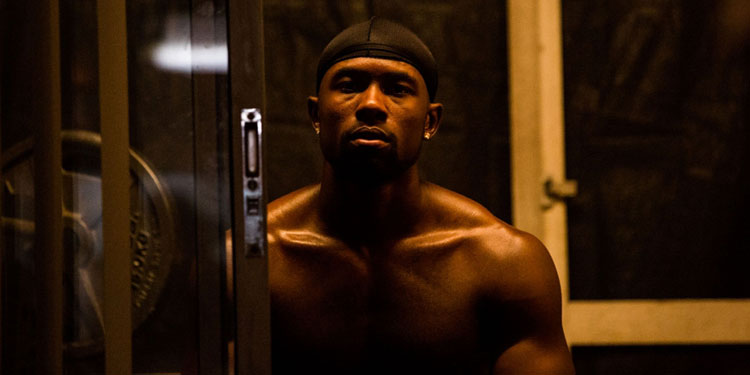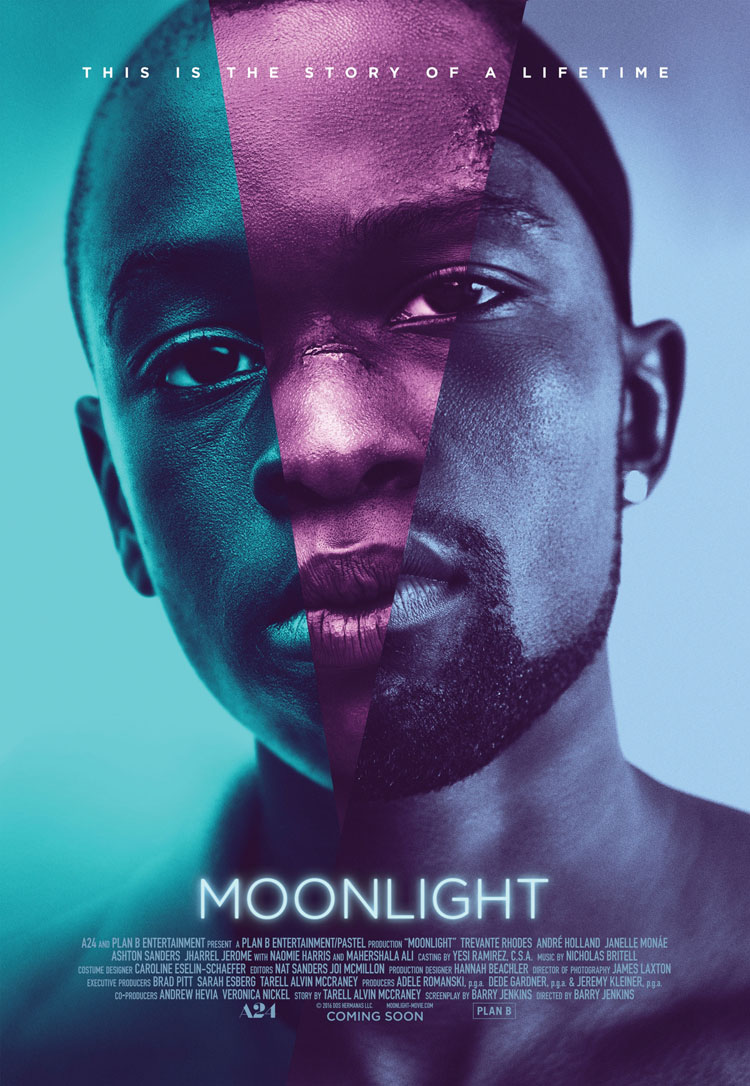
Director: Barry Jenkins
Running Time: 111 mins
Certificate: 15
Release Date: February 17th 2017 (UK)

Oftentimes it’s not too far into the year when you can see which movies are likely to be lining up for the Oscar race. However, Moonlight seemingly came out of nowhere, became far more successful at the US box office than most expected (setting records along the way) and immediately had people suggesting it ought to be up for loads of awards. Even so, many wondered whether it would miss out, simply because it was a small film released by a US distributor that doesn’t have the money for the sort of massive Oscar campaign a studio can mount.
Thankfully it defied the odds, scoring eight Oscar nominations. It’s taken a while, but now the movie is arriving in the UK, and it’s been worth the wait.
The movie is split into three vignettes, showing us small sections of the life of Chiron – as a child, a teenager, and a young adult – as he grows up in a tough part of Miami. We’re first introduced to him as ‘Little’, a small boy who’s almost raising himself due to the fact his mother (Naomie Harris) is a junkie. She loves her child, but her dependence of crack overrules good parenting. Little then meets Juan (Mahershala Ali), a drug pusher with a surprisingly tender side, who becomes a kind of father figure.
Next Chiron is a teenager – a quiet, shy, introspective young person, struggling to work out who he will be as a man. He’s just starting to discover his sexuality, but also faced with a world where aggression, demanding respect and the possibility of violence are even present, and where softness – let alone someone being gay – is hard to countenance.
Finally, he’s a young man, known by the nickname ‘Black’, suddenly faced with the choices he’s made up to that point, the possibility of reconnecting with something/someone missing in his life, and left thinking about both his past and his future.
Moonlight is a quiet, contemplative film, riven through with a slightly melancholic air. And when I say quiet, I mean it. There’s remarkably little dialogue, but even so it pulls you into this world, making you feel for young Chiron, and the difficulties of the situation he’s placed in. He starts out a picture of innocence, being assailed by things that seem set to destroy that purity and mould him into someone that isn’t really true to who he is. Even Juan, who shows Chiron friendship and a positive role model, is the type of drug dealer responsible for helping his mother to destroy her life.
Click here to watch the trailer for Moonlight
With beautifully understated, naturalistic performances from most of the cast, Moonlight impressively explores African American sexual identity and the pressures of growing up. Initially Naomie Harris seems to have slightly fallen in from another movie with her hyperbolic junkie mother, but she quickly becomes the powerful counterpoint to the quietness that pervades much of the movie, leading to a scene towards the end where Harris underscores why she deserves her Oscar nomination. Likewise, Mahershala Ali is great as Juan, bringing depth and complexity to a role that could easily have fallen into the kind of stereotypes the movie is trying to challenge. Kudos must also go to Trevante Rhodes as the older Chiron, who manages to bring together an intimidating masculinity and the echoes of a sensitive child needing love into a single person without it seeming contrived.
Moonlight is a study of African American masculinity and what it means, with Chiron constantly assailed by pressures pushing him in different directions. It would have been easy for the movie to present the central character’s sexuality as a kind of weakness, but it’s almost the opposite – living it is the hard choice that would take more bravery and honestly than the bravado and need for status that surrounds him and sometimes feels like his only rational option. The movie also becomes an interesting take on the nature vs. nurture debate, suggesting that while sexuality may not be a ‘choice’, how men express their masculinity isn’t innate.
It adds up to a movie that is almost a modern tragedy, but one that wants to suggest a sense of hope and the possibility of change. It’s not a movie with a traditional narrative and some may not respond to its somewhat elegiac tone and the fact it’s not a story with a conventional beginning, middle and end. At times it’s more like a poem than a movie, constantly evoking a sense of who these people are rather than outright telling us. Moonlight is also filled with beautiful imagery and wonderful ideas, from the almost biblical scenes of Juan teaching Chiron how to swim, to the way the constant, almost hyper-real sunshine contrasts with the story we’re seeing – a harsh light shone on things that can only be seen obliquely.
Even if it misses out of many of the other Oscars (which sadly seems likely), it ought to get one for Sound Design, as few films have been so good at telling its stories and exploring its characters purely through sound. Whether it’s moments where external voices fade or a judicious choice of music, at time Moonlight uses sound to pull us into Chiron’s experiences in a surprisingly visceral way.
It’s a haunting movie and one that’s well worth watching and pondering.
Overall Verdict: Well-deserving of the praise it’s received, Moonlight is a moving look at the pressures that young men can face, potentially pushing them towards a type of masculinity that may be emotionally crippling for them. Sensitively investigating racial identity, social position and sexuality, this triptych exploration of a young man’s journey is a special film.
Reviewer: Tim Isaac
Leave a Reply (if comment does not appear immediately, it may have been held for moderation)